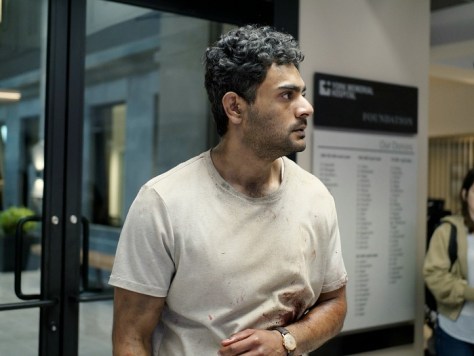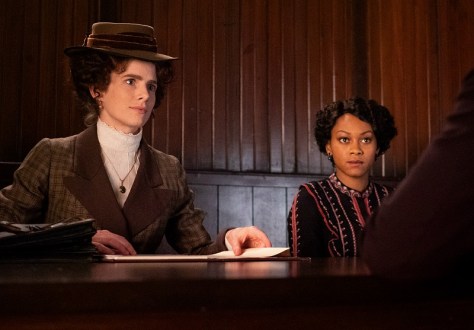Virginia Rankin has executive-produced some of the most compelling series in Canadian television. From 19-2 to Bad Blood and This Life she, and the folks at Sphère Média Plus, have brought unique characters and compelling stories to primetime TV.
The latest is Transplant. Airing Wednesdays at 9 p.m. ET/PT on CTV, Rankin’s newest project debuted to strong ratings in Canada. Starring Hamza Haq as Dr. Bashir “Bash†Hamed—a Syrian doctor with battle-tested skills in emergency medicine—it appears she’s got another success on her hands.
We spoke to Virginia Rankin about how Transplant was created, and how the TV market has changed for a company like Sphère Média Plus.
Take me back to the beginning. How did Transplant come about?
Virginia Rankin: I work very closely with Tara Woodbury, who’s our head of development, and Tara really wanted to do something around immigration and refugees. Her family, her extended family, sponsors a Sudanese refugee, so she has firsthand experience with it and so she wanted to do something around that. And my experience, in 20 years of television, is that it’s incredibly hard to tell those stories because mainstream networks are like, ‘Ah, it sounds like an issue. We don’t do issues.’ So, I sort of a little hesitant, but she was really passionate about it. And at first, we were bouncing around ideas like rom-coms and comedies and this kind of thing.
 At the same time, we knew that [CTV] was looking for a medical show to replace Saving Hope. And we also knew that we wanted to work with Joseph Kay. I had had a great experience working with him on This Life. We sort of cornered him. We all kind of sat around and threw ideas around and then one night, in the middle of the night, they kind of all came together and the title Transplant came to me and that was some debate about whether it should be The Transplant, by the way, or Transplant. But for me, it was just Transplant and I saw the poster and on the poster was Hamza Haq.
At the same time, we knew that [CTV] was looking for a medical show to replace Saving Hope. And we also knew that we wanted to work with Joseph Kay. I had had a great experience working with him on This Life. We sort of cornered him. We all kind of sat around and threw ideas around and then one night, in the middle of the night, they kind of all came together and the title Transplant came to me and that was some debate about whether it should be The Transplant, by the way, or Transplant. But for me, it was just Transplant and I saw the poster and on the poster was Hamza Haq.
We knew from working with him what a great guy he was and that he’s the full hero package. He’s charismatic, he’s handsome as anything, he’s got the acting chops and he’s a wonderful human being. My job was done and then it was over to Joe and Joe just took those simple elements and he went away and he did a lot of deep diving, a lot of research and he came back and he pitched us this beautiful story of Bash and his sister Amira as Syrian refugees and their new lives in Canada.
It was really all created by Joseph.
Just to clarify, Hamza was not attached. We didn’t say it has to be this guy and we hadn’t attached him in any way. We actually went through a full audition process before we attached him, but he did come on as a consultant. So he read the draft and gave Joe his thoughts.
He actually had to audition and we did audition a number of Syrian actors. We looked quite extensively at Arab actors. And when it came down to it, he was still the guy who we really thought could bring an audience to the show.
What is it about Joseph Kay that ticks the boxes when it comes to a showrunner?
VR: It’s how seriously he takes his job. It’s the research that he does. He has to really know his characters in a deep way. And he does that. He does that work. He’s a wonderful collaborator. I’ve worked on two shows with him now and I just love the creative conversation with him and how he listens and he thinks and he takes everything on board. And then he comes out with beautiful work. So, I can’t say enough good things about working with him.
 As you said, Hamza is fantastic. You can’t help but cheer for this guy.
As you said, Hamza is fantastic. You can’t help but cheer for this guy.
VR: He’s a leading man. He’s Omar Sharif and you don’t see that that often either. And frankly, I think we’re incredibly lucky that we kind of discovered him when we did. I mean, he already had it long CV, but certainly, this is his first major, major leading role. And I feel like a year or two from now we wouldn’t have been able to get him. So, I feel like he’s going to break out. But luckily for us, he loves the show. He’s really, really, really passionate about it and he works so hard and put so much of his heart and soul into it.
When you see NBCUniversal International Studios attached to this, I can’t help but think about the way that the market has changed and how it’s become truly international. As a producer, has there been a seismic shift in the way that you go about making television shows here in this country and how you shop them around?
VR: It’s interesting. It is quite different working with NBC than it has been working with the other international distributors we’ve worked with in the past. NBC sees itself as a studio. We don’t have a studio system in Canada. In Canada, we, the production company, sees ourselves as a studio because we own the copyright and the cashflow and we do all that stuff. But NBC does see themselves more like a studio. Their participation is on a level that they’ve earned that. And so they are much more actively involved than the experience I’ve had with other international distributors, which is great because you do want your show to sell around the world and they obviously know how to do that. So, we really appreciate their perspective and we really hope that the show does succeed in significant markets around the world.
What can you say about Bash’s journey through the first season of the show?
VR: The journey of Bash is, to a certain extent, to allow himself to release some of his secrets because some of his secrets are kind of killing him. He’s carrying guilt and trauma as any refugee will have, any survivor will have. And he’s sharing those things and he perhaps needs to share them more for his own sake, for his own survival. So that is his character journey, which is to learn to let some of those secrets go.
The first episode ends with Bash sitting down with Jed Bishop and Jed saying, ‘Let’s have that job interview over again.’ Is this going to be a mentor-mentee type of relationship, a father-son relationship between these two?
VR: Yes, yes, absolutely. There’s the father-son dynamic there and like any father-son or parental relationship, it’s not always nice. It’s not always pretty. So on both sides, there’s rebellion from the son figure and there are disappointments from the father figure, it’s all of those variations of the father-son relationship.
Transplant airs Wednesdays at 9 p.m. ET/PT on CTV.
Images courtesy of Bell Media.















